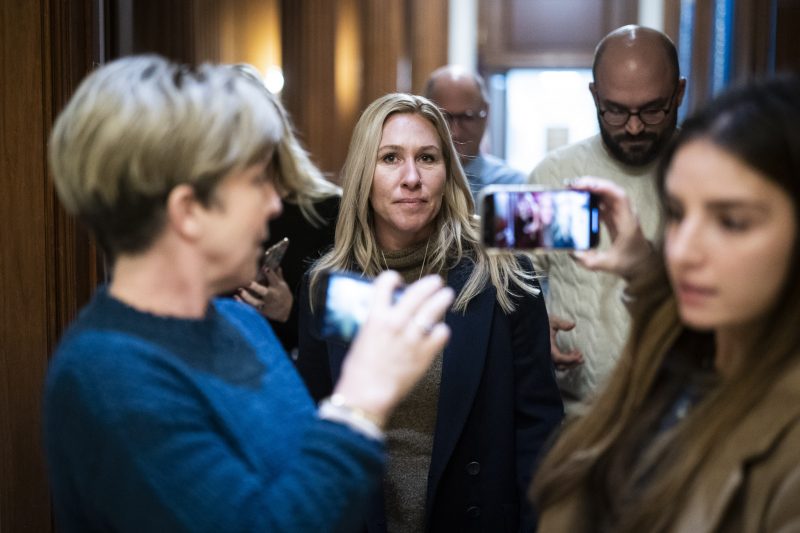An early high water mark in the GOP’s efforts to minimize the events of Jan. 6, 2021, came in early February 2022: The Republican National Committee not only voted to censure two members who had joined the committee investigating the insurrection, it decided to insert a phrase into the censure resolution practically dripping with provocation: “legitimate political discourse.”
Supporters of the measure quickly sought to assure that the phrase didn’t refer to those who stormed the U.S. Capitol and got violent, but the resolution itself made no such distinction. And it was little mystery why: Republicans had spent the past year downplaying the events of that day and trying to rewrite a story that didn’t reflect particularly well on the party. The resolution invited those who believed this attack on the seat of government wasn’t that bad, or even that it was justified — that is, a significant portion of the GOP — to go right on believing that.
This weekend saw another such event: Rep. Marjorie Taylor Greene (R-Ga.) making a “joke” about how Jan. 6 could have turned out differently had she been in charge, while mocking those who have cast blame on her and Trump ally Stephen K. Bannon.
“I want to tell you something: If Steve Bannon and I had organized that, we would have won,” Greene said. “Not to mention, it would’ve been armed.”
Marjorie Taylor Greene’s Jan 6th comments at Gala:
“I got to tell you something, if Steve Bannon and I had organized that, we would have won. Not to mention, it would’ve been armed.”
Reckon there would be a lot more people doing a lot more prison time if ya were pic.twitter.com/Xf6Ykv5MKw
— Terrence Daniels (Captain Planet) (@Terrence_STR) December 12, 2022
The statement carries with it all the plausible deniability that the RNC resolution did, since Greene was telling jokes onstage at an event for young Republicans in New York. (Her office issued a statement criticizing those who were “trying to weaponize a sarcastic joke I made.”) The provocateur congresswoman is inviting journalists to write this up as if it were an entirely serious comment, at which point she can claim persecution — a valued commodity.
But consider the game Greene is playing. She’s making Jan. 6 a punchline and inviting extremists in her party to believe that there’s more than a hint of truth in her quip — even that she’s expressing common cause with the insurrectionists (“we would have won”). And given her priors, it’s no secret what the intent is, no matter how much she’ll claim otherwise.
It’s a remarkable moment, but also one that’s been a long time coming.
The night of Jan. 6 and in the days and weeks afterward, GOP leaders lamented and almost universally condemned it as a particularly dark day in our nation’s history. House Minority Leader Kevin McCarthy (R-Calif.) took the House floor a week later to say President Donald Trump bore “responsibility” — and even that he should be censured.
“Of all the days here, last Wednesday was the worst day I’ve ever seen in Congress,” McCarthy said. “Our country is deeply hurt. So where do we go from here? After all the violence and chaos of the last week, it is important to remember that we’re still here to deliver a better future for all Americans. It does not matter if you are liberal, moderate or conservative. All of us must resist the temptation of further polarization.”
Within months, though, GOP members not only cast doubt on the “insurrection” label — which is, in fact, apt — but they lodged conspiracy theories seeking to absolve their supporters of blame. Along the way, their media allies like Fox’s Tucker Carlson offered baseless and later-debunked suggestions that this was the product of FBI instigation.
When Republicans declined to sign off on a bipartisan Jan. 6 commission, they effectively admitted that they were doing so because they didn’t want to keep talking about that day. But to make the case that it wasn’t worth probing, of course, they had to imply that it wasn’t that big a deal.
By early 2022 came the RNC censure resolution, which was condemned by some members of the party for its reference to “legitimate political discourse.” But the die was cast. As Trump has pushed the idea of pardons for those accused of wrongdoing on Jan. 6, the party has drifted more and more into believing that the L-word applied.
A Monmouth University poll in July showed not only that many more Republicans labeled Jan. 6 a “legitimate protest” than an “insurrection,” but that more Republicans also labeled it a “legitimate protest” even than a “riot.”
Against that backdrop, a particularly extreme congresswoman from Georgia has decided that a quip like this might land with a certain crowd of young Republicans in New York.
But also consider the substance of the quip. While Greene hasn’t been linked to organizing the insurrection, she did tell people on the eve of Jan. 6, “You can’t allow it to just transfer power ‘peacefully’ like Joe Biden wants and allow him to become our president, because he did not win this election.”
Bannon was even more forthright in predicting chaos that day, after whipping his listeners into a frenzy over false allegations of a stolen election. “All hell is going to break loose tomorrow,” he said on Jan. 5. “Just understand this: All hell is going to break loose tomorrow. It’s going to be moving. It’s going to be quick.”
And despite the narrative that is often spun by Republicans, there is plenty of evidence that insurrectionists were armed. To what extent? We’ll never fully know because the vast majority of them weren’t apprehended at the time.
But comments downplaying the events of that day are key to the effort to retcon it. And Greene arguably has more power than ever to do so, thanks to how important she is to McCarthy’s chances of becoming speaker next month. So despite GOP leaders, including McCarthy, having initially made such stark statements about just how dark that day was, you can bet they’ll have relatively little to say about someone turning it into a punchline and inviting listeners to imagine a more successful insurrection.
The effect, though, is that the next provocation will be even more dramatic, and the events of that day will continue to be legitimized in the minds of a significant number of Americans.








